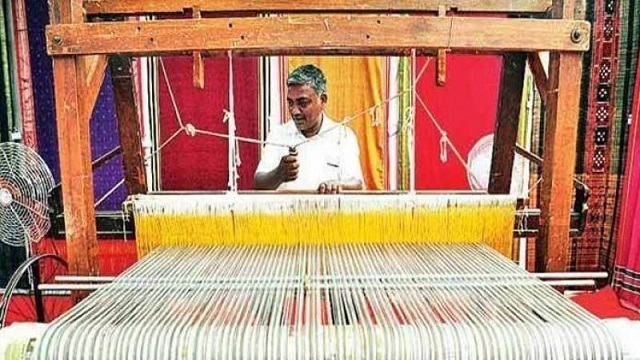Saree production in TN hit as weavers strike work
Production of traditional Tamil Nadu sarees at Sankarankoil has taken a hit after the power loom weavers commenced a 12-day strike on April 18.
The weavers are protesting the increase in cotton yarn prices.
Tamil Nadu Master Weavers Association and Textile Weavers Association that is spearheading the strike said that they have appealed several times to both the central government and state government against the rising prices.
Secretary of Master Weavers Association, T.S.A Subramanian while speaking to IANS said:
“The price of a yarn bundle weighing 4.75 kg has been increased from Rs 1,455 in April 2020 to Rs 2,385 in April 2022 and we faced a 64 per cent price hike in a short period. Even after the Union government has reduced the tax by 11 per cent for imported cotton, the yarn prices keep increasing. The hoarders are keeping a huge stock of yarn leading to its increase in prices.”
He also said that there were 30 lakh families who are dependent on 6 lakh power loon units in Tamil Nadu and said that the strike at Sankarankoil was only a token strike and that all the traditional saree production in the state would come to a grinding halt if the government does not act in an urgent manner.
Subramanian said that in Sankarankoil alone there are 4,000 power loom units and 20,000 families are dependent on these units. He said that the weavers of Sankarankoil are paying a monthly GST of Rs 1 crore on production and an amount of Rs 50 lakh is paid as GST for purchasing cotton hank yarn worth Rs 10 crore.
The weavers association leader also said that an amount of around Rs 150 crore is paid a month by the power loom weavers of Tamil Nadu on production and around Rs 75 crore on the purchase of yarn.
He also said that Chief Minister M.K. Stalin must immediately intervene in the matter and bring out a solution, and call upon stringent action against the traders who are hoarding up the cotton yarn.
It is to be noted that a power loom produces a minimum of one saree a day unlike in handloom where a weaver requires a minimum of fifteen days to produce a saree.
A total of 4,000 power looms shutting down means the production of a minimum of 4,000 sarees is affected and these Sankarankoil sarees range from Rs 800 to Rs 3,500.
Weavers are also worried that the loss of production of sarees would lead to the market shifting base and hence the weaving community of Sankarankoil wants the government to intervene and reduce the cotton yarn prices and thereby restart the production in power looms.
R. Girijabhai, a weaver at Sankarankoil while speaking to IANS said: “This strike was forced on us by the state and central governments. Even after repeated appeals, they have not intervened in our matter. If the cotton yarn prices are skyrocketing on a daily basis even after the import duty of cotton is reduced by 11 percent, it means there is something wrong in the market. Market forces are playing with the lives of poor power loom weavers and we cannot allow to be fooled. Government must take stringent action against the hoarders and also take steps to bring down the cotton yarn prices on a war footing.”
She said that the Chief Minister and the state textile minister Gandhi take steps and solve the imbroglio.

